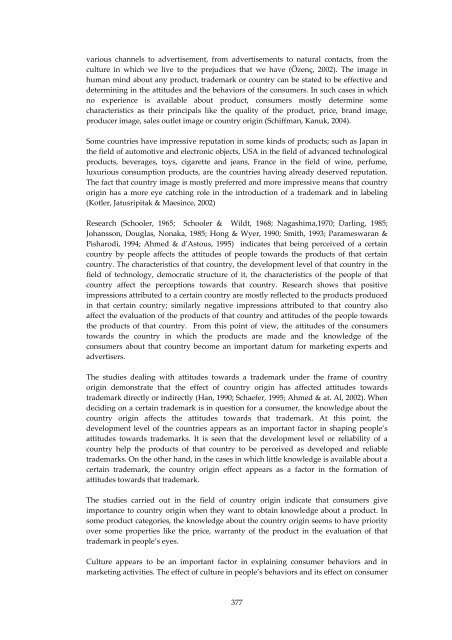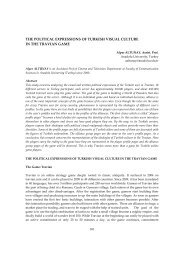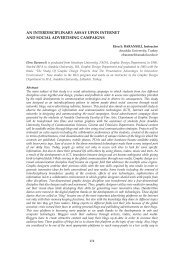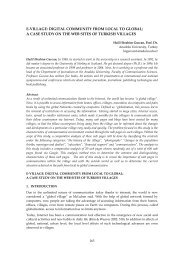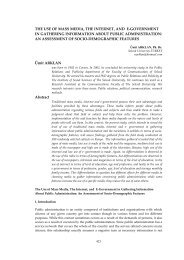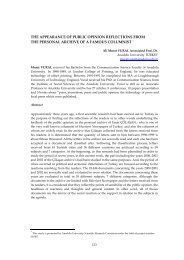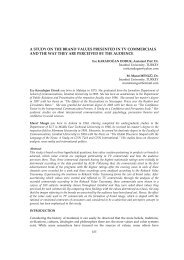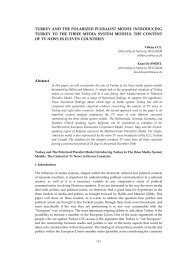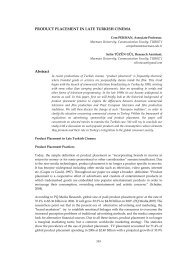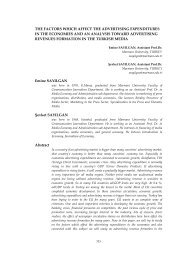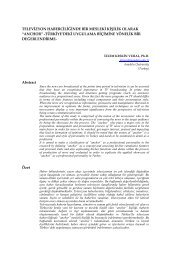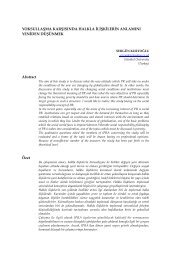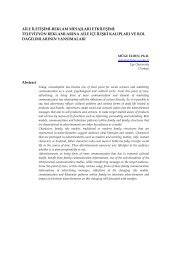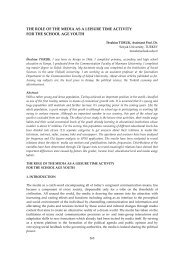the evaluation of turkish consumers' attitudes towards foreign products
the evaluation of turkish consumers' attitudes towards foreign products
the evaluation of turkish consumers' attitudes towards foreign products
Create successful ePaper yourself
Turn your PDF publications into a flip-book with our unique Google optimized e-Paper software.
various channels to advertisement, from advertisements to natural contacts, from <strong>the</strong><br />
culture in which we live to <strong>the</strong> prejudices that we have (Özenç, 2002). The image in<br />
human mind about any product, trademark or country can be stated to be effective and<br />
determining in <strong>the</strong> <strong>attitudes</strong> and <strong>the</strong> behaviors <strong>of</strong> <strong>the</strong> consumers. In such cases in which<br />
no experience is available about product, consumers mostly determine some<br />
characteristics as <strong>the</strong>ir principals like <strong>the</strong> quality <strong>of</strong> <strong>the</strong> product, price, brand image,<br />
producer image, sales outlet image or country origin (Schiffman, Kanuk, 2004).<br />
Some countries have impressive reputation in some kinds <strong>of</strong> <strong>products</strong>; such as Japan in<br />
<strong>the</strong> field <strong>of</strong> automotive and electronic objects, USA in <strong>the</strong> field <strong>of</strong> advanced technological<br />
<strong>products</strong>, beverages, toys, cigarette and jeans, France in <strong>the</strong> field <strong>of</strong> wine, perfume,<br />
luxurious consumption <strong>products</strong>, are <strong>the</strong> countries having already deserved reputation.<br />
The fact that country image is mostly preferred and more impressive means that country<br />
origin has a more eye catching role in <strong>the</strong> introduction <strong>of</strong> a trademark and in labeling<br />
(Kotler, Jatusripitak & Maesince, 2002)<br />
Research (Schooler, 1965; Schooler & Wildt, 1968; Nagashima,1970; Darling, 1985;<br />
Johansson, Douglas, Nonaka, 1985; Hong & Wyer, 1990; Smith, 1993; Parameswaran &<br />
Pisharodi, 1994; Ahmed & dʹAstous, 1995) indicates that being perceived <strong>of</strong> a certain<br />
country by people affects <strong>the</strong> <strong>attitudes</strong> <strong>of</strong> people <strong>towards</strong> <strong>the</strong> <strong>products</strong> <strong>of</strong> that certain<br />
country. The characteristics <strong>of</strong> that country, <strong>the</strong> development level <strong>of</strong> that country in <strong>the</strong><br />
field <strong>of</strong> technology, democratic structure <strong>of</strong> it, <strong>the</strong> characteristics <strong>of</strong> <strong>the</strong> people <strong>of</strong> that<br />
country affect <strong>the</strong> perceptions <strong>towards</strong> that country. Research shows that positive<br />
impressions attributed to a certain country are mostly reflected to <strong>the</strong> <strong>products</strong> produced<br />
in that certain country; similarly negative impressions attributed to that country also<br />
affect <strong>the</strong> <strong>evaluation</strong> <strong>of</strong> <strong>the</strong> <strong>products</strong> <strong>of</strong> that country and <strong>attitudes</strong> <strong>of</strong> <strong>the</strong> people <strong>towards</strong><br />
<strong>the</strong> <strong>products</strong> <strong>of</strong> that country. From this point <strong>of</strong> view, <strong>the</strong> <strong>attitudes</strong> <strong>of</strong> <strong>the</strong> consumers<br />
<strong>towards</strong> <strong>the</strong> country in which <strong>the</strong> <strong>products</strong> are made and <strong>the</strong> knowledge <strong>of</strong> <strong>the</strong><br />
consumers about that country become an important datum for marketing experts and<br />
advertisers.<br />
The studies dealing with <strong>attitudes</strong> <strong>towards</strong> a trademark under <strong>the</strong> frame <strong>of</strong> country<br />
origin demonstrate that <strong>the</strong> effect <strong>of</strong> country origin has affected <strong>attitudes</strong> <strong>towards</strong><br />
trademark directly or indirectly (Han, 1990; Schaefer, 1995; Ahmed & at. Al, 2002). When<br />
deciding on a certain trademark is in question for a consumer, <strong>the</strong> knowledge about <strong>the</strong><br />
country origin affects <strong>the</strong> <strong>attitudes</strong> <strong>towards</strong> that trademark. At this point, <strong>the</strong><br />
development level <strong>of</strong> <strong>the</strong> countries appears as an important factor in shaping people’s<br />
<strong>attitudes</strong> <strong>towards</strong> trademarks. It is seen that <strong>the</strong> development level or reliability <strong>of</strong> a<br />
country help <strong>the</strong> <strong>products</strong> <strong>of</strong> that country to be perceived as developed and reliable<br />
trademarks. On <strong>the</strong> o<strong>the</strong>r hand, in <strong>the</strong> cases in which little knowledge is available about a<br />
certain trademark, <strong>the</strong> country origin effect appears as a factor in <strong>the</strong> formation <strong>of</strong><br />
<strong>attitudes</strong> <strong>towards</strong> that trademark.<br />
The studies carried out in <strong>the</strong> field <strong>of</strong> country origin indicate that consumers give<br />
importance to country origin when <strong>the</strong>y want to obtain knowledge about a product. In<br />
some product categories, <strong>the</strong> knowledge about <strong>the</strong> country origin seems to have priority<br />
over some properties like <strong>the</strong> price, warranty <strong>of</strong> <strong>the</strong> product in <strong>the</strong> <strong>evaluation</strong> <strong>of</strong> that<br />
trademark in people’s eyes.<br />
Culture appears to be an important factor in explaining consumer behaviors and in<br />
marketing activities. The effect <strong>of</strong> culture in people’s behaviors and its effect on consumer<br />
377


